Introduction
The modern world has seen many fundamental changes in the field of education. However, the most critical change that has occurred concerns the learners themselves. Due to the higher life expectancy and our rapidly changing world, a growing number of adults find themselves in need of new skills in order to keep up with the demands of the job market. Thus, it has become crucial for educators to develop adult learning techniques.
Adult Learning Theories
- Andragogy.
- Self-directed learning.
- Transformative learning.
- Experiential learning.
The most important adult learning theories include andragogy, self-directed learning, experiential learning, and transformative learning.
The concept of andragogy, developed by M. Knowles in 1980, pertains to the method of engaging adults in the process of learning by emphasizing the applicability of learned material, as well as triggering the learners’ internal motivation (Staff, 2011, p. 1).
In self-directed learning, the student assumes both the roles of the learner and the teacher, selecting the necessary resources, organizing the study schedule, and devising the methods of evaluation.
As for transformative learning, scientific literature offers many views on the matter (Staff, 2011, p. 2). However, a common understanding of transformative learning focuses on the sharing of a variety of viewpoints by the learners via group discussion. In essence, this approach entails a change in the students’ outlooks, frames of reference, and general perceptions of a particular subject.
Experiential learning focuses on the educational process conducted via many different forms, including experimentation, games, entertainment, and adventure, touching upon every aspect of the student’s personality (Beard & Wilson, 2013, p. 5).
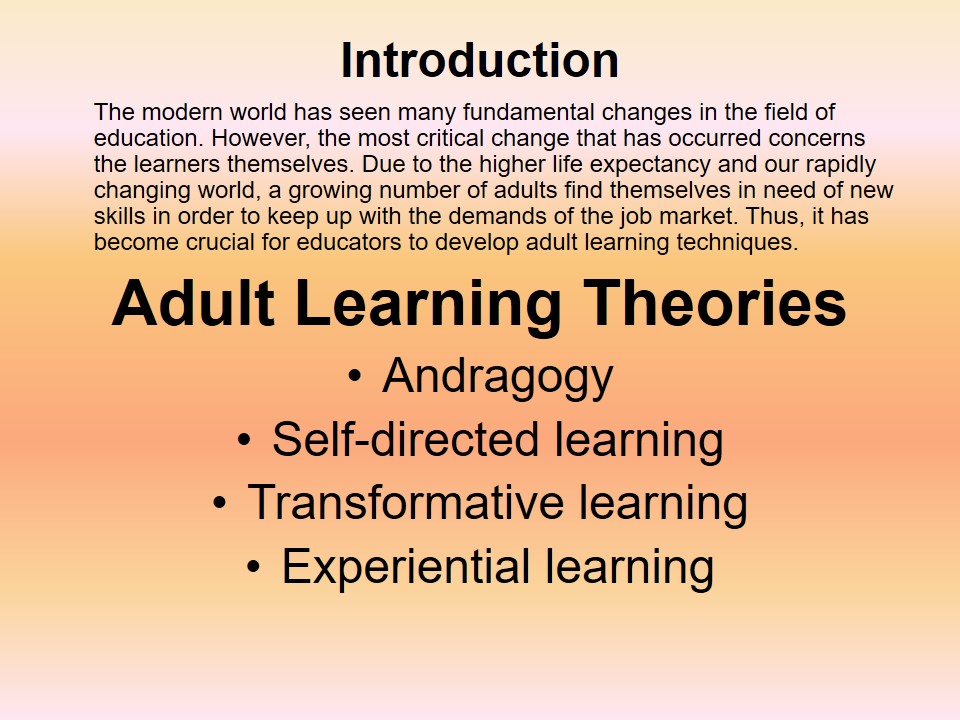
Lessons Learned
The idea of transformative learning has deeply altered my perception of adult education. It captured my attention by stressing the importance of comparing various perspectives and of encouraging students to participate and challenge each other through discussion.
Experiential learning has had a profound influence on me as well. As its underlying principle is experience in all forms, it enhances the learning process by developing every aspect of the human experience. These two theories have had a major impact on my personal understanding of adult education. Prior to taking this course, these concepts seemed applicable only to pedagogy. However, after this course, I find the idea of combining transformative and experiential adult learning extremely promising.
Before completing the course, my understanding of adult learning theories was rather vague. Due to my lack of knowledge, the concept of adult learning seemed obvious.
However, upon completion of the course, my perception has changed radically. Studying several theories and approaches to adult learning has helped me grasp the importance of the issue.
While examining the extent to which my understanding of adult learning has changed, it is important to highlight the theories that proved most influential for me.
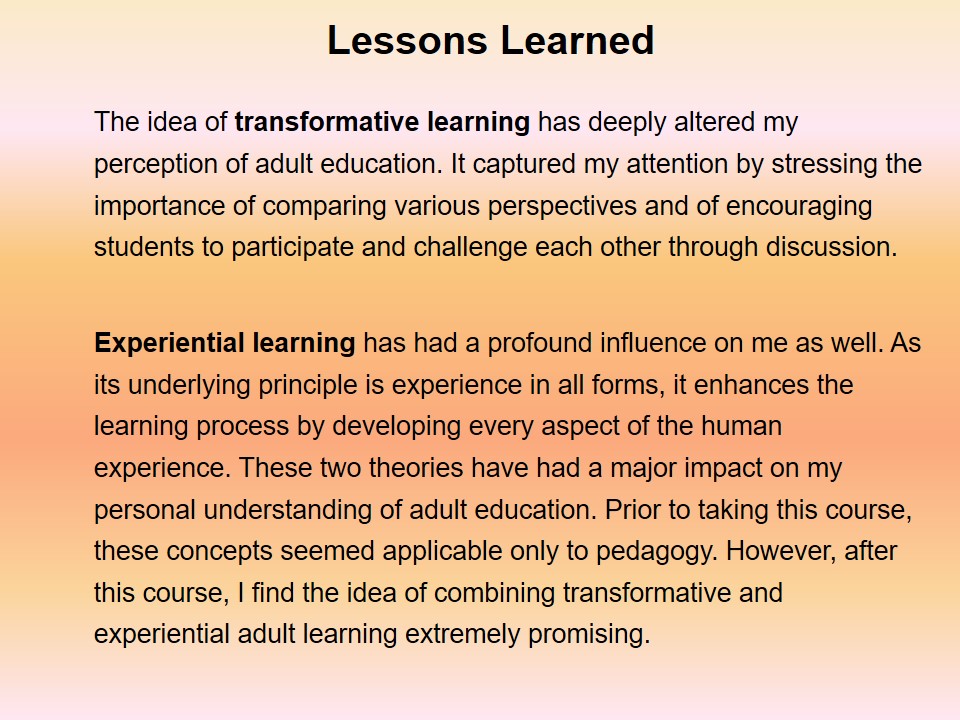
Definition of Adult Education
First, it is necessary to establish what adult education is: a process in which adults engage in activities to master certain skills or gain a deeper understanding of certain ideas. Regardless of the particular learning theory, it is usually a self-directed process based on internal, rather than external, motivation (Staff, 2011, p. 1). The learning objectives are tailored to the students’ current needs and goals. Each learner’s experience provides a rich foundation for the acquisition of new skills, while simultaneously allowing the learner to change perceptions and gain new insights by altering his or her worldview.
Overall, adult education is a multifaceted process that is individually tailored to the current needs of the learner. It engages existing skills to master new ones and encourages the learner to alter his or her present worldviews.
As adult learning has become increasingly significant in our modern world, various approaches have been devised for its purposes. In order to define adult education, however, it is crucial to consider certain points and characteristics of different methods.
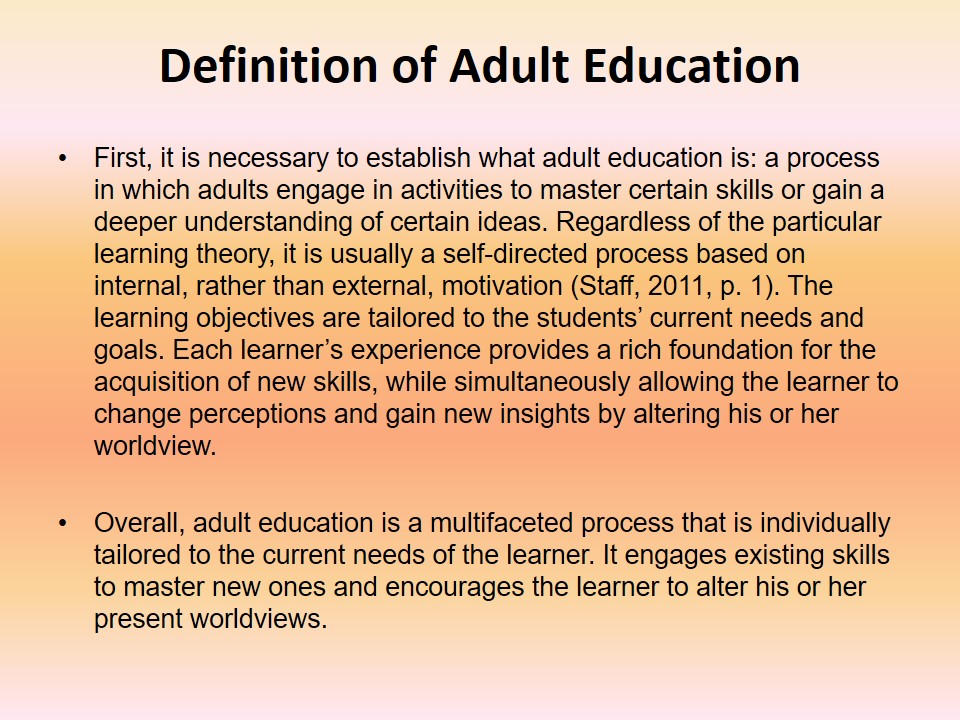
Key Concepts
Internal motivation is one of the most critical concepts in adult education (Cranton, 2011, p. 53). It is related to the goals set by the learner, as well as the reasons why these goals have to be achieved. Understanding students’ internal motivations provides the opportunity to adjust the learning process to their current needs and expectations.
The problem-centered approach is another crucial concept for adult education. The adult learning process is most efficient when it is focused on particular tasks to be performed and problems to be solved (Staff, 2011, p. 1). Therefore, it is important to provide learners with practical assignments in which they can directly apply both old and recently acquired skills.
Critical reflection, pertaining to the transformative method of learning, is of the utmost importance as well. Despite the fact that the students’ experiences play a significant role in their studies, it is necessary to encourage the learners to question their existing beliefs and opinions, so that they can discover new perspectives. Gaining a deeper understanding of certain matters might at times require the adoption of an entirely different viewpoint, which is why the learner might need to rethink previous assumptions (Staff, 2011, p. 2).
The last key concept is the empowerment of adult learners. To yield better results, the learners need to feel responsible for their studies. This is why it is crucial to involve them in decision-making processes. This approach will increase the motivation to learn and help the learners gain confidence. Providing opportunity for discussion and encouraging all learners to air their opinions are important empowering methods as well (Cranton, 2011, p. 57).
Under the Servicemen’s Readjustment Act of 1944, World War II veterans were entitled to educational programs financed by the government (Jolly, 2013). Today, the U.S. Department of Education allows minorities to enroll in the Traditionally Underserved Populations program. In both programs, adult learning methods have to be carefully adjusted to fit the needs of learners, taking into account their backgrounds, previous experiences, and cultural heritages. Because of these government programs, these adults have been able to discover new prospects and career opportunities.
There are several important adult learning concepts that will contribute to the framework of my future professional approach.
The concept of empowerment is especially significant in the context of underserved populations or people who either decided or were forced to change professions.
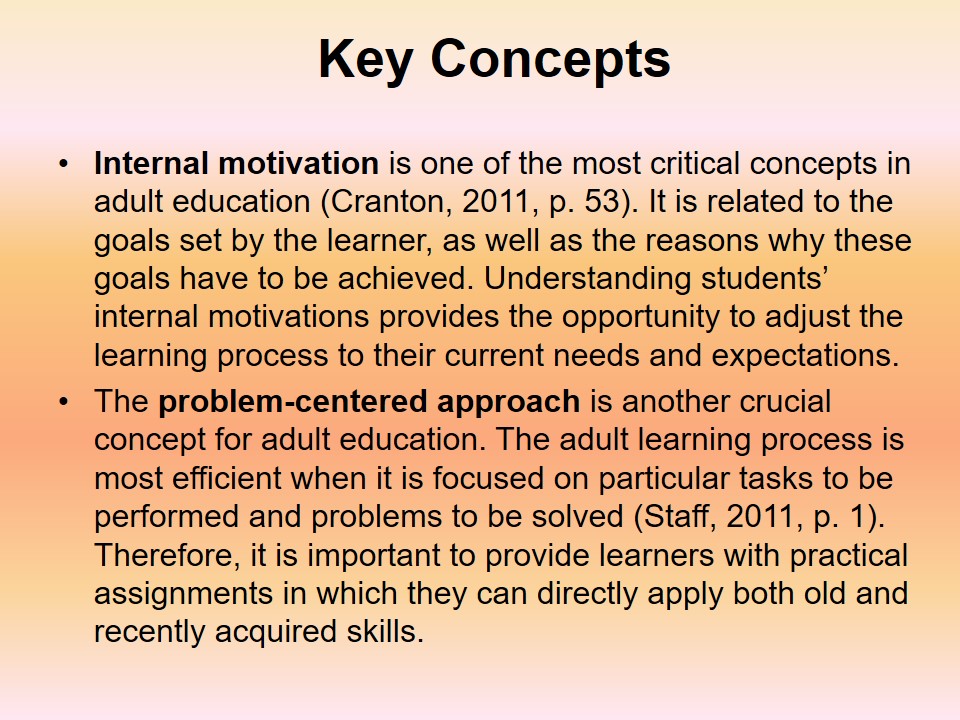
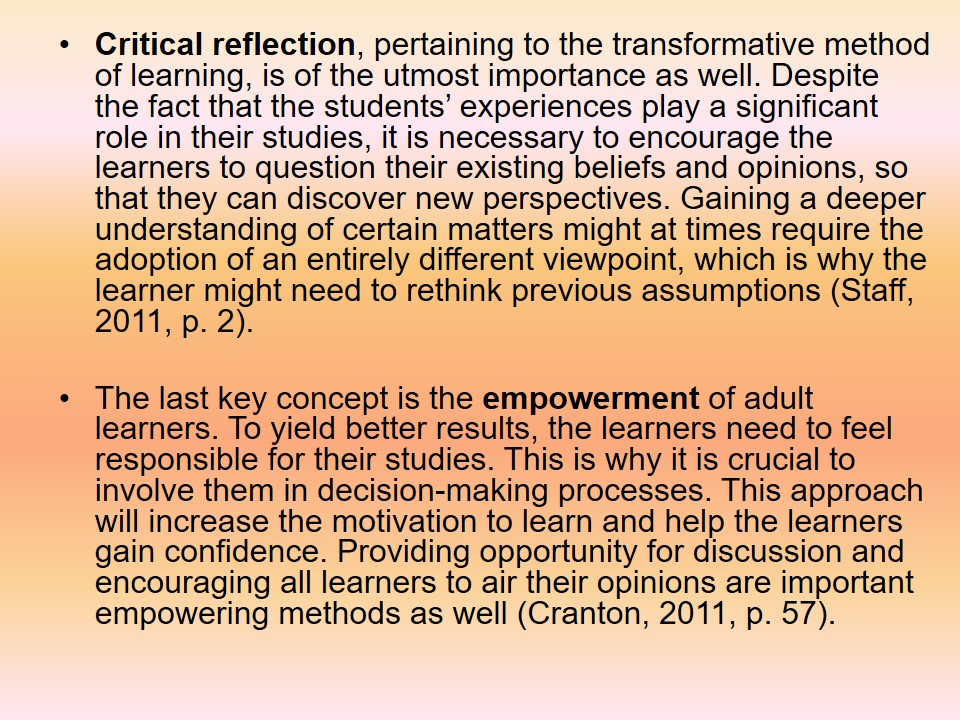
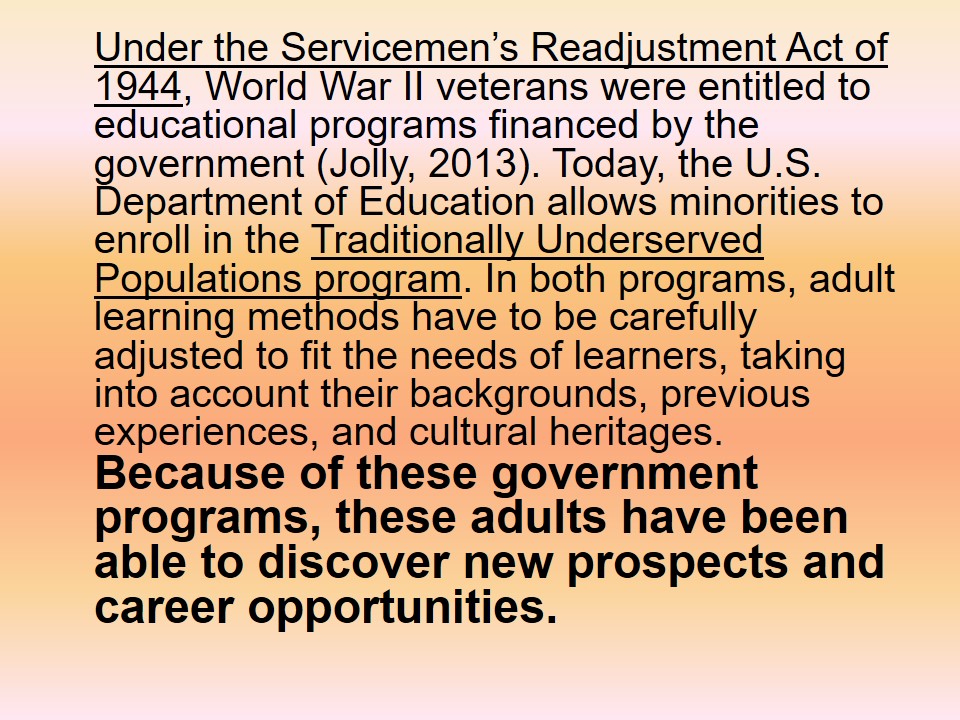
Devising a Strategy
Since internal motivation is essential to adult learning, the role of the teacher includes understanding the motivation, as well as helping the student remain highly motivated throughout the learning process.
To this end, the first step is to devise a personalized approach to the student in order to determine his or her reasons for and objectives of learning. The next step consists of adjusting the learning material and resources to these objectives. Thus, the student will remain highly motivated.
In order to apply the concept of critical reflection, which is crucial for the student’s professional development, it is necessary to create discussion groups.
The teacher should assume the role of discussion moderator, providing dialogue topics and stimulating the flow of discussion. The moderator encourages learners to voice their opinions on the subject and emphasizes the need to question their existing beliefs and values.
In order to apply the concepts of internal motivation and critical reflection in the adult learning process, it is necessary to devise an efficient strategy.
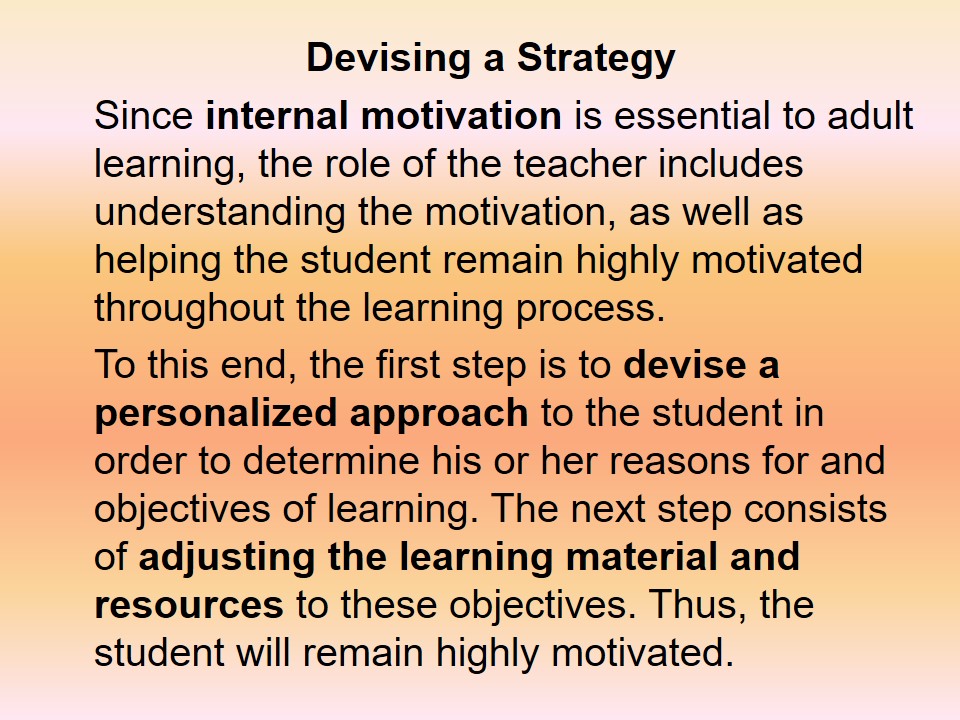
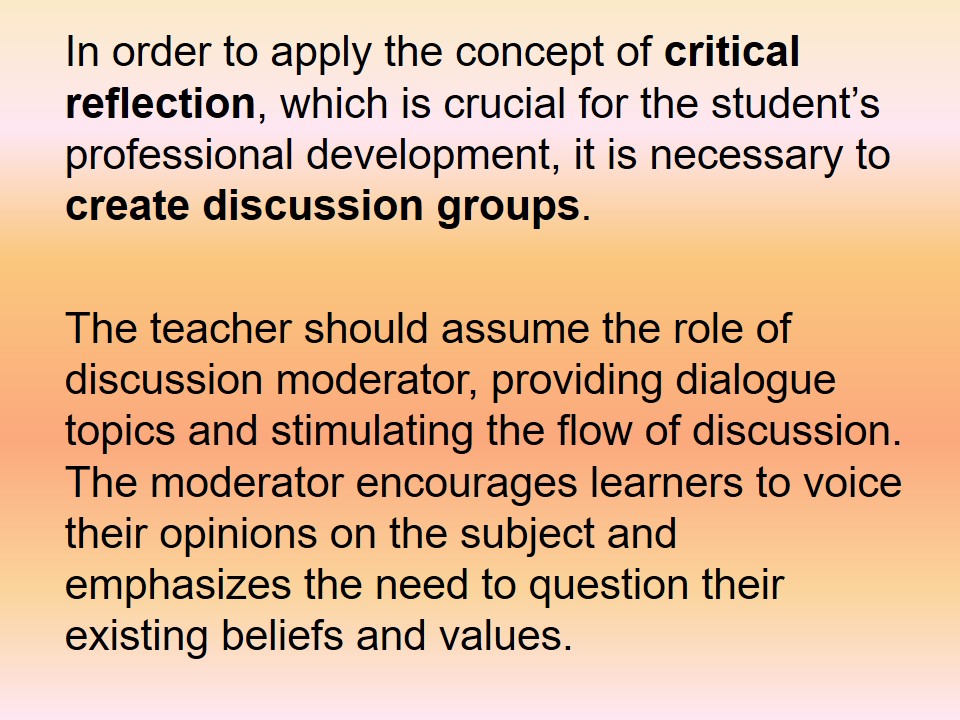
References
- Beard, C., & Wilson, J. P. (2013). Experiential learning: A handbook for education, training and coaching. Philadelphia, PA: Kogan Page Publishers.
- Cranton, P. (2011). Adult learning and instruction: transformative-learning perspectives. In K. Rubenson (Ed.), Adult learning and education (pp. 53-60). Oxford, England: Academic Press.
- Jolly, J. L. (2013). Historical perspectives: the Servicemen’s Readjustment Act of 1944. Gifted Child Today, 36(4), 266-268.
- Staff, T. C. (2011). Teal center fact sheet no. 11: Adult learning theories. Web.